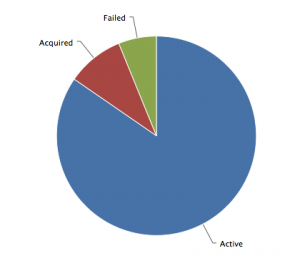Please let me know (in the comments) if my slightly off-topic forays into the world of internet-startups are interesting, boring … or, somewhere in between.
If you’re still not sure, read today’s post then answer the poll 🙂
I’m sure that many people are put off the idea of starting a business – any business, not just a web-business – by the perceived failure rates: the ‘urban myth’ is that 9 out of 10 businesses fail in their first five years, so I wouldn’t blame you for simply dismissing the idea of becoming an entrepreneur!
For you, though, the chance of failure is 50/50: either you will fail … or you won’t.
Statistics (i.e. what happens to OTHER small business owners) mean nothing to you … but, your personal success or failure means everything.
Even if you subscribe to the statistics more than my philosophical view, we can still agree because the real numbers are much closer to 50/50 than 90/10 [click on the image to enlarge]:
[Source: Amy Knaup, Monthly Labor Review]
The chart shows that the four year survival rate for small businesses across the USA is anywhere from nearly 40% to nearly 60%. While not quite 5 years, and not quite 50/50 (you can reduce these 4 year survival rates by approx. 10% for each succeeding year), it’s certainly not as glum an outlook as the 90% failure rate that the popular press would have you believe.
So, how would you like a surefire way to tell IN ADVANCE if your Internet-business has an 85% chance of surviving, with an additional 9% chance of being sold for millions of dollars, and with a ‘booby prize’ of at least a 75% chance of achieving a huge amount of additional funding (an average of $500k)?
Fortunately, for the Internet entrepreneur there is a super-reliable way of doing this:
Simply apply to join one of the respected Venture Accelerators springing up all over the world!
If you DO manage to make your way through their selection process, here’s what you can expect in terms of survival/success after 4 years:
[Source: Techstars]
Time to dust off that business plan?







What a timely post! I was actually just looking at venture accelerators yesterday. I have a few questions for you Adrian:
1) How would you go about selecting a venture accelerator to work with?
2) It seems that most venture accelerators require that you relocate to their location for at least 3 months. Do you know if this is always the case?
Thanks!
-Erik
@ Erik – 1) http://techcocktail.com/top-15-us-startup-accelerators-ranked-2011-05 … if you’re in Boulder, Techstars would seem to be the go, and Y Combinator not only gives you upfront money (and assistance) but they have a deal with a top VC to give EACH graduate company a further $150k in funding on favorable (for you!) terms; pretty hard to beat that deal 2) on the down side, I’m guessing that most require relocation. Spend some time on quora.com if you want to learn more.
Adrian, I think no matter what business people start, the internet is going to be a big part of it – so I voted for more on this topic.
I also feel that it’s very difficult when looking for good internet business advice, to sift through all the “internet businesses” that make money selling information on how to run an internet business. I don’t know if it’s just me, but there seems to be a bit of an incestuous cycle there.
I don’t want to be reading about how to be successful on the internet by telling others how to be successful on the internet, so that they can buy my little e-book which tells them to tell others how to be successful – and so the cycle continues into an infinite loop of emptiness. … I don’t see how that is actually contributing value to society as a whole.
That’s why I like reading your stuff, because you have run “real” businesses, and I’m assuming that when you talk about internet businesses, those will be real businesses adding real value to society, and consequently earning a well deserved return.
And I’m becoming more and more convinced that it’s close to impossible to ever make your number without starting your own business.
Adrian, Thanks for the input. While browsing quora.com, I found several mentions of Startup Weekend (a non profit group funded by the Kauffman Foundation). Seems like a very interesting experience and well worth the price of admission (~100 to cover food). Have you heard anything about this organization? If so, what are your thoughts?
@ Erik – I’ll know more on Monday. This weekend, my cofounder is helping to run the Startup Weekend in Melbourne!
@ Ashton – For some reason I missed your comment, and skipped over to Erik’s first time around. All of your observations are spot on 🙂
@ Adrian – That’s great! How did Startup Weekend Melbourne go?
Pretty good, so I’m told, Erik. Although, it seems to be aimed at coders: ‘how much code can you write on the weekend’ stuff. May not be where you’re heading …